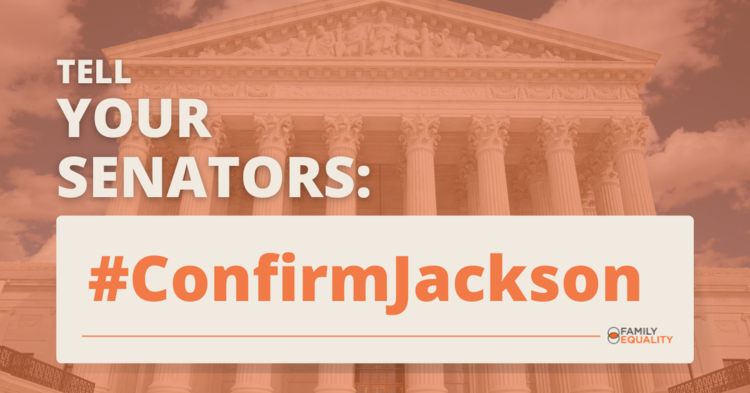By: Sa’Metria Jones
With the Biden Administration’s historic nomination of Judge Ketanji Brown Jackson to the Supreme Court of the United States, we have an opportunity to create a court that better reflects the strength and diversity of our families. After the Senate Judiciary Committee moved forward with a deadlocked vote on party lines, our State Policy Council, Sa’Metria Jones, is sharing what having a #JusticeForAll means for our families.
Exceptionally qualified
Judge Ketanji Brown Jackson, an overqualified Black woman who will soon be the next Justice on the United States Supreme Court, endured a brutal, public degradation of her character and qualifications during her confirmation hearings, and she handled it with integrity, class, and grace.
The intentional and unrelenting attacks on Judge Jackson, despite glowing endorsements and her extensive resume, were uncomfortably familiar. As a Black woman and lawyer, I know the complexities of navigating predominately white and male spaces all too well—from microaggressions dressed up as compliments (like being told you’re “articulate”) to being the only Black woman in the room constantly saddled with the burden of having to do better than good enough just for a chance to get the same opportunities and exposure that are freely given to your white colleagues. The display of white and male superiority that was put on during the confirmation hearings would, during any other job interview, be enough for any Black woman to say “thanks, but no thanks,” and rightfully so. In fact, my Twitter feed was full of people asking, “Why would she still want this job?”
A fair question that I cannot answer. What I do know is that this country needs a Justice like Judge Ketanji Brown Jackson.
The stakes are high
Once confirmed, Judge Ketanji Brown Jackson will be the first Black woman to sit on the United States Supreme Court, and the significance of her confirmation must not be understated. The Supreme Court of the United States is the final arbiter of justice—a finality that has massive implications for if and how Americans realize the promises and rights set forth in our founding documents. The implications are more substantial for Black and Brown men and women, religious minorities, children, low-income communities, and LGBTQ+ individuals.
The stakes are high—and even that is an understatement. During the confirmation hearing, several senators indicated their displeasure with pivotal Supreme Court cases that clarified the extent to which due process and equal protection ensure, for example, our right to marry who we love and have autonomy over our own bodies without government interference. Judge Ketanji Brown Jackson faced a revealing barrage of questions about her position on a variety of issues, including the teaching of “divisive topics,” (like a curriculum that accurately discusses the very real racist history of this country and how its inequity continues to manifest today); the preservation of “parental autonomy;” and whether trans students can play on sports teams that align with their gender identity. Clearly, and concerningly, these issues are on the minds of our nation’s lawmakers.
A commitment to neutrality
Time and time again, Judge Jackson reiterated her commitment to neutrality and applying the law to the facts of each individual case “without fear or favor.” So what does her commitment to neutrality mean for us? It means that we can be confident that she will uphold the legal doctrine of stare decisis.
It also means that her extensive experience interpreting and applying the law as a federal judge will withstand tactful attempts from political extremists who use the judicial system to deny others their basic civil rights and liberties—the same civil rights and liberties that the founding fathers declared we all were to enjoy.
It means that Black and Brown people, women, LGBTQ+ individuals, and any other person living in this country who has experienced the weaponization of the judicial system and political process to chip away at their civil liberties will have one more advocate in their corner.
One more Justice committed to fairness and justice.
Justice Jackson is what this country needs
In a country where we are still experiencing so many “firsts” in 2022, the confirmation of the first Black woman to the United States Supreme Court is a step towards building a judiciary that looks like the people it serves. Judge Ketanji Brown Jackson is what this country needs. While she will not sit on the bench alone, her passion, lived experience, and commitment to justice is just the energy we need from a Supreme Court Justice.
In the words of Cory Booker, “This country is getting better and better and better. When that final vote happens, and [Judge Ketanji Brown Jackson is] sent on to the highest court in the land, I’m going to rejoice.”

Urge your senators to #ConfirmJackson
It’s not too late to urge your senators to confirm Judge Jackson! Click here to contact your senators and urge them to move our country closer to the promise of equality and justice for all!
Read More
On Being an LGBTQ+ Parent in the Media with Eliecer Marte | OUT WITH IT ft. JAYMES BLACK
Award-winning journalist, Eliecer Marte, joins Family Equality President and CEO Jaymes Black on “Out with It” to discuss coming out and becoming a parent while navigating a career in journalism and living in the public eye.
On Corporate Pride with Alexis Kantor and Nancy Lyons | OUT WITH IT ft. JAYMES BLACK
Listen as Jaymes talks with business leaders and LGBTQ+ advocates, Alexis Kantor and Nancy Lyons, about rainbow-washing and corporate pride.
Family Spotlight: Wendy & Nancy
On this LGBTQ Families Day, we celebrate the story of Indianapolis couple, Wendy and Nancy, and their family.



